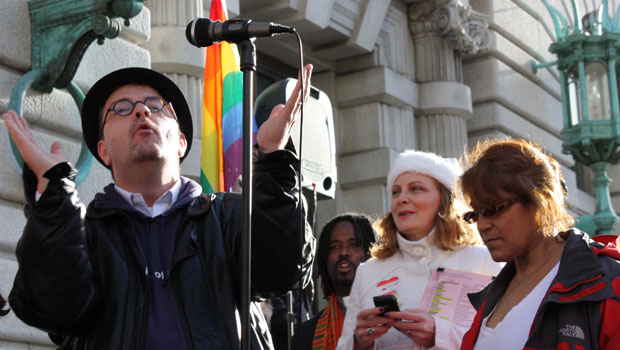We live in a paper world: checkbooks, receipts, essays, sketchbooks, and the ever-versatile paper napkin. But for millions of gay and lesbian Californians, one very important piece of paper is out of reach. And, to Beth Tepper, executive director of Children of Lesbians and Gays Everywhere, “that one little paper means a lot.”
That piece of paper is a certificate of marriage. Last week, the 9th U.S. Circuit Court of Appeals heard arguments for and against Proposition 8, the ban on same-sex marriage. Though same-sex couples know their lives and their families are valid, Proposition 8’s denial of their rights sends a message that their relationships have been deemed invalid. That gives license to further discrimination by narrow-minded individuals, by giving this intolerance legitimacy under the law.
Mary Murphy, Urban science teacher and co-faculty adviser for Urban’s Gay Straight Alliance (GSA) says, there is a “pressure of constantly having an authority saying the way you are living your life and raising your children is wrong.”
One of the most inconceivable arguments for the same-sex marriage ban is that the children of such parents aren’t being raised in healthy, functional families. For the 37,000 children of same-sex couples living in California, hearing that their families are illegitimate is the most unhealthy and injurious message a child could hear.
Elly Fireside-Ostergaard (’12), co-head of GSA says, “I do not think I am more screwed up than anyone else I know. I know a bunch of people who are raised by straight parents, who get divorced, have resentment or hate for their parents and act out. I don’t think that [reaction] is related to the sexuality of the parents.”
As long as Proposition 8 exists, discrimination will persist against relationships that are not strictly heterosexual. The government cannot condone discrimination. However, with Proposition 8, it does. The message is that intolerance is okay —and that thousands of families are not worthy of rights typically granted to all citizens of California.
For Fireside-Ostergaard, “It is the difference between feeling something and knowing something. I do feel like my family is a family because we are one cohesive unit and we all love each other but its still like the one little nagging thing. If Proposition 8 can pass because more than half of California wanted it to pass then they don’t think my family is a family.”
It is time that California’s law reflects the reality of all of its citizens — and that it permits all people who make a commitment to one another, regardless of sexual orientation, to have a right to the legal and societal advantages of marriage. There are times when the law needs to lead before the people can follow. Now is that time.


